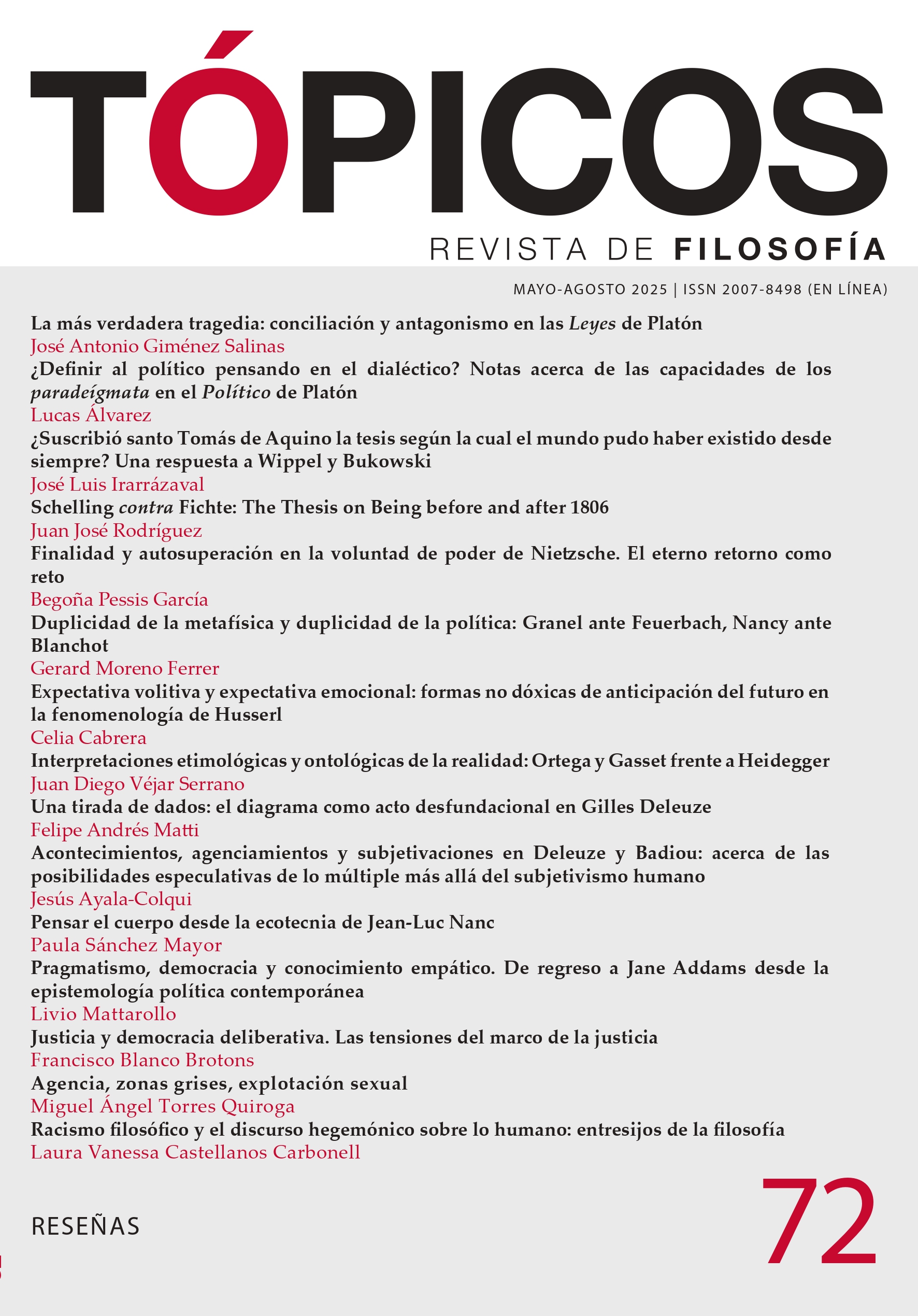Published 2025-04-29
Keywords
- body,
- ecotechnique,
- nature,
- technique,
- world
Copyright (c) 2025 Tópicos, Revista de Filosofía

This work is licensed under a Creative Commons Attribution-NonCommercial-NoDerivatives 4.0 International License.
How to Cite
Abstract
The status of the human body is decided in the dichotomy between nature and technique. Jean-Luc Nancy approaches this debate from a deconstructive perspective: “there is no nature”. With this provocative statement, he opens the reflection on ecotechnique. “Ecotechnique” is a term that points to the technical constitution of the world, to a structio in which bodies are interrelated under the logic of technical supplement. His proposal thus invites us to think of the human body as that which emerges in the interweaving of technical relations considering both the risk of falling into an ecotechnique dominated by capital and the possibilities of generating new relations that promote the meaning of the world.
References
- Aristóteles. (2011). Ética a Nicómaco. J. L. Calvo Martínez (trad.). Alianza.
- Aristóteles. (2016). Física. G. R. de Echandía y C. García Gual (trad.). Gredos.
- Billi, N. (2009). Jean-Luc Nancy. Hacia una ontología ecotécnica para un ‘giro material’ del mundo. Instantes y Azares: Escrituras Nietzscheanas, 6-7, 221-237.
- Bulo Vargas, V. (2012). Entre naturaleza y técnica: una cuestión de tacto. Revista de Filosofía, 68, 55-64. https://doi.org/10.4067/S0718-43602012000100005
- Derrida, J. (1985). La voz y el fenómeno. Introducción al problema del signo en la fenomenología de Husserl. F. Peñalver(trad.). Pre-textos.
- Descartes, R. (1991). El mundo o el tratado de la luz. A. M. Rioja Nieto (trad.). Alianza.
- Descartes, R. (1995a). Discurso del método. G. Quintás, V. Peña y J. Bayod (trads.). Círculo de Lectores.
- Descartes, R. (1995b). Principios de filosofía. G. Quintás (trad.). Alianza.
- Hörl, E. (2012). Nancy et la technologie. En G. Berkman y D. Cohen-Levinas (eds.), Figures du dehors. Autour de Jean-Luc Nancy (pp. 267-292). Éditions Nouvelles Cécile Defaut.
- La Mettrie, J. O. (1961). El hombre máquina. Á. J. Cappelletti (trad.). Editorial Universitaria de Buenos Aires.
- Nancy, J.-L. (2002). Un pensamiento finito. J. C. Moreno Romo (trad.). Anthropos.
- Nancy, J.-L. (2003a). El sentido del mundo. J. M. Casas (trad.). La Marca.
- Nancy, J.-L. (2003b). La creación del mundo “o” la mundialización. P. Perera (trad.). Paidós.
- Nancy, J.-L. (2005). Hegel. La inquietud de lo negativo. J. M. Garrido (trad.). Arena Libros.
- Nancy, J.-L. (2008). Las musas. H. Pons (trad.). Amorrortu.
- Nancy, J.-L. (2010a). Corpus. P. Bulnes (trad.). Arena Libros.
- Nancy, J.-L. (2010b). Ser singular plural. A. Tudela Sancho (trad.). Arena Libros.
- Nancy, J.-L. (2011). El “hay” de la relación sexual. C. de Peretti y F. J. Vidarte (trads.) Síntesis.
- Nancy, J.-L. (2013). Archivida. Del sintiente y del sentido. M. Bardet y V. Bulo (trads.). Quadrata.
- Nancy, J.-L. (2021). La frágil piel del mundo. C. Rofríguez Marciel y J. Massó Castilla (trads.). De Conatus.
- Santos, J. (2006). Bocas pintadas. Un acercamiento a la reflexión estética de Jean-Luc Nancy. Anthropos, 205, 103-115.
- Stiegler, B. (2002). La técnica y el tiempo. I. B. Morales Bastos (trad.). Hiru.
- Stiegler, B. (2004a). La técnica y el tiempo. II. B. Morales Bastos (trad.). Hiru.
- Stiegler, B. (2004b). La técnica y el tiempo. III. B. Morales Bastos (trad.). Hiru.





